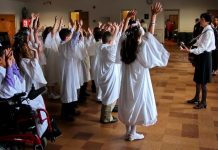
By Sr. Patricia M. McCormack, IHM
A Retreat for Catechists
Every director of religious education faces recruitment dilemmas. Classes are scheduled to resume in two weeks, and you still have a shortage of help. You need three catechists and an aide. You are anxious to fill your vacancies. Despite bulletin ads, pleas to teachers in nearby Catholic schools, and personal recruiting phone calls, you’ve come up empty. What to do? You are tempted to think, “Any warm body will do! Anyone can do it.”
But can anyone be a catechist?
We already intuit the truth: There really is a difference between working as a catechist and, indeed, being a catechist. It is a distinction that Pope Francis explained during the International Congress on Catechesis, September 27, 2013. He said: “Catechesis is a vocation; ‘being a catechist,’ this is the vocation; not working as a catechist.”
All DREs are deeply grateful for their catechists’ service. Yet while some people seem to be born with the catechist charism, many others must grow into it over time.
As a DRE or faith formation leader, you have the privileged responsibility to nurture the catechist vocation within your volunteer staff.
Vocation is a call from God, to God, and for God. It is an invitation to recognize, accept, embrace, and then celebrate that you are the imago dei — the “image of God” in the world. Recognition and development of one’s vocation grows with life experiences and exposure to spiritual practices. That combination leads to an encounter with Jesus, and it sets the course of your future because it shapes your being.
As I’ve written in my recent book, Engaging the Parking Lot Parent:
BEING is the critical factor in the vocation of catechist. The most skilled educational practice in the world (DOING) will fail to evangelize if BEING is neglected. It is the person of the catechist that attracts; not the organization of a class or program tactics.
Pope Francis offers this inspiration:
“Catechesis is a vocation: ‘being a catechist,’ this is the vocation; not working as a catechist. [Being a catechist embraces your whole life.] It means leading people to encounter Christ by our words and our lives, by giving witness. … What attracts is our witness. Being a catechist means witnessing to the faith, being consistent in our personal life. … We lead others to Jesus with our words and our lives, with our witness. … People should see the Gospel, read the Gospel, in our lives.” (Audience to Catechists, September 27, 2013)
Goals and functions of the catechist vocation
Goals – The vocation of being a catechist focuses on three ongoing goals: 1) being close to Jesus, 2) imitating Jesus, and 3) being courageous. A DRE can help staff members to cultivate these goals through discussion, ongoing events of a formative nature, and retreat days or sessions for recollection.
Functions – The catechist vocation blends three prioritized functions: 1) animated witness, 2) mentor-educator, and 3) effective teacher.
When faith is alive and well within us, it shows. Actually we can’t hide it! That spark attracts others to curiosity, at least; a desire to imitate, at best. Our faith becomes dynamic — ever growing. We walk the walk and learn from our ups and downs. We then become credible mentors who educate from our life experience. Others view us as real and approachable — as human beings who are in the process of becoming. Only then might we be effective teachers who integrate our faith in every instruction.
These functions are the heart and focus of the retreat, BEING a Catechist versus WORKING AS a Catechist.
Recommendations
Provide opportunities for a variety of prayer practices, ruminating on the Scripture and sitting in the presence of the Blessed Sacrament with an emphasis on being aware that Jesus is looking upon them — exactly as they are — with love.
Acquaint catechists with the concepts of spiritual direction, soul companioning, and cultivating a daily spiritual practice.
Dialogue together about practical ways to leave self behind and go out to initiate encounter with others, be open to others, and avoid rigidity.
Learn how to adapt to the needs of the parent community in your parish. Be flexible; go outside your comfort zone. Be creative in proclaiming the gospel.
The rest of this article will share the tools you’ll need to offer a retreat for your catechists.
The retreat already has a prepared slide presentation (provided via an online download) that you can use. (See the resource list, below.)
The slides will help you present the defining characteristics for each function. You’ll also be prompted to help lead others in exploring these three functions through the teaching of Pope Francis, the Church’s primary catechist.
Examples
- You will explore Pope Francis’ characteristics, such as his ready smile, nondefensive stance, and infectious optimism. These are examples of animated witness. You will call catechists to never underestimate the value of a smile and encourage them to expend effort, energy, enthusiasm, and dedicated commitment.
- You will point to things like the ease, familiarity, and intimacy with God that Pope Francis demonstrates. He illustrates what an educator/mentor looks like. Here you will invite catechists to perform “moral miracles” and trace the ways of grace that have seasoned their own lives.
- You will highlight Pope Francis’ gift as an effective teacher who instructs from the heart — with messages that are clear, succinct, respectful, and compelling. You will challenge catechists to speak from a prepared heart and deliver the message with a simple, nonjudgmental attitude.
After each section of the presentation, there is time to talk about the content in small groups and/or within the large group. Each “Exchange Thoughts” slide helps you to engage the catechists in personal application and discussion.
Inspiration from the Church
Finally, let papal voices conclude the presentation. You’ll review some of these key ideas from the popes of the last 50 years:
Pope Paul VI: “The men of our day are more impressed with witnesses than by teachers, and if they listen to these it is because they also bear witness” (Evangeli Nuntiandi, 41).
Pope John Paul II: “People today put more trust in witnesses than in teachers, in experience than in teaching, and in life and action than in theories” (Redemptoris Missio, 42).
Pope Benedict XVI: “The Church does not grow by proselytizing; she grows by attracting others” (Conference of Latin American Bishops, May 13, 2007).
Pope Francis: “Being a catechist … embraces your whole life. It means leading people to encounter Christ by our words and our lives, by giving witness. … What attracts is our witness. Being a catechist means witnessing to the faith, being consistent in our personal life. … We lead others to Jesus with our words and our lives, with our witness” (Audience to Catechists, September 27, 2013).
Dear DRE: Your role in forming catechists is mission-critical. Spend some time reviewing the content for this retreat and make plans to invite both newcomers and veteran catechists to this special event. The more you invest in the them, the greater the return for the kingdom of God.
For effective catechesis, being is more critical than doing. So, again I ask: Can anyone be a catechist?
RESOURCES
Retreat planning tips
Schedule: Plan for about four hours together, depending on the activities you choose to add. Your schedule may include:
- Content: “BEING versus DOING” — Plan for two hours for the slide presentation and dialogue portions.
- Welcome and gathering time, with refreshments.
- Prayer times: Opening prayer, liturgy, closing prayer. If possible, offer time for private prayer in the presence of the Blessed Sacrament.
- Additional refreshments or a meal.
- Materials: Name tags, note-taking supplies, slide projector, and screen.
Three resources to support the retreat
- Chapter three of Engaging the Parking Lot Parent (Twenty-Third Publications). Available as an excerpt at Catechist.com/McCormackCH3.
- The PowerPoint slide presentation, “BEING versus DOING” by Sr. Pat McCormack, at Catechist.com/McCormackRetreatSlides.
- Pope Francis’ Speech to Catechists, September 27, 2013. Found at the Vatican website via this link: CATmag.us/2spCVNc
- A PDF of this article.
SR. PATRICIA M. MCCORMACK , IHM, Ed.D., is an international formation-education consultant, and author of Engaging the Parking Lot Parent. Find more at ParentTeacherSupport.org.




